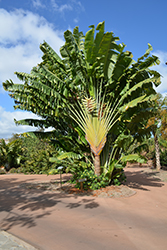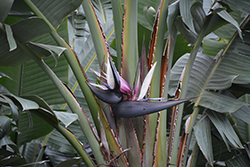It's all about ...
plants

Traveller's Palm
Ravenala madagascariensis
Height: 50 feet
Spread: 20 feet
Sunlight:
![]()
Hardiness Zone: 10a
Other Names: Traveller's Tree
Description:
A spectacular, tree-like plant that eventually forms an unbranched trunk, topped by a fan shaped, single plane of large, oval green leaves with split margins, on long, thick petioles; makes a spectacular, large area landscape accent
Ornamental Features
Traveller's Palm features unusual spikes of white flag-like flowers with red overtones and steel blue calyces held atop the branches from mid winter to early spring. The flowers are excellent for cutting. It has attractive dark green foliage with grayish green undersides. The enormous deeply cut oval leaves are highly ornamental and remain dark green throughout the winter. The rough khaki (brownish-green) bark adds an interesting dimension to the landscape.
Landscape Attributes
Traveller's Palm is an evergreen tree with a strong central leader and an indistinguished habit of growth. Its relatively coarse texture can be used to stand it apart from other landscape plants with finer foliage.
This is a relatively low maintenance tree, and should not require much pruning, except when necessary, such as to remove dieback. It is a good choice for attracting birds to your yard. Gardeners should be aware of the following characteristic(s) that may warrant special consideration;
- Suckering
Traveller's Palm is recommended for the following landscape applications;
- Accent
- Shade
- Vertical Accent
- Hedges/Screening
Planting & Growing
Traveller's Palm will grow to be about 50 feet tall at maturity, with a spread of 20 feet. It has a high canopy of foliage that sits well above the ground, and should not be planted underneath power lines. As it matures, the lower branches of this tree can be strategically removed to create a high enough canopy to support unobstructed human traffic underneath. It grows at a slow rate, and under ideal conditions can be expected to live for 50 years or more.
This tree should only be grown in full sunlight. It does best in average to evenly moist conditions, but will not tolerate standing water. This plant should not require much in the way of fertilizing once established, although it may appreciate a shot of general-purpose fertilizer from time to time early in the growing season. It is not particular as to soil pH, but grows best in rich soils. It is somewhat tolerant of urban pollution. This species is not originally from North America..
This plant is not reliably hardy in our region, and certain restrictions may apply; contact the store for more information.

